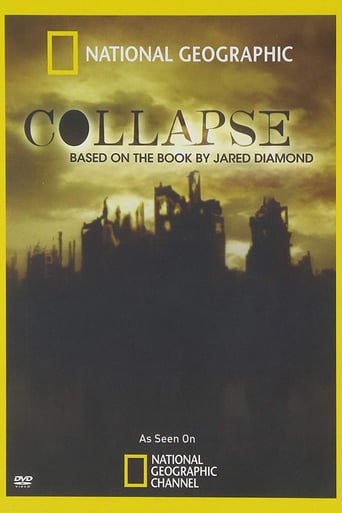Timbuktu5
While appreciating Jared Diamond's "time machine" approach in examining the challenges of resource shortages, I have serious reservations regarding his solutions.Diamond's philosophic approach is obviously leftist which, unfortunately, leads to troubling conclusions. By including Climate Change (i.e. the religion of man-made global warming), Diamond loses all credibility in addressing humanity's responsibility regarding shortages in legitimate areas such as water and food.What is most disheartening is Diamond's failure to recognize his own elitism, typical of other leading "catastophe" proponents such as Al Gore and Nancy Pelosi. While passionately advocating for a drastically reduced life style that can't come soon enough, we see him driving a first-rate automobile and shopping at a first-rate grocery store. Again, Diamond and other high visibility proponents would have much more credibility if they began implementing the "reduced life style" now. However, I am dubious Gore and Pelosi will be giving up their private jets and automobiles in the near future.Like all sane people who appreciate the importance of good stewardship of our resources and the desire for responsible environmentalism, I find it most disturbing when Diamond suggests that free people cannot be trusted to address these concerns. Instead, we are to believe that only massive government regulation can offer salvation.
stephen740
Based on the book by Jared Diamond, produced by National Geographic, and with a who's who of environmental heavy weights, this should be killer documentary. Unfortunately, I have to report that the National Geographic production, while expensive with very good production values, has made a muddled mess of Diamond's masterpiece. For those who don't know the book, Diamond with amazing detail and careful logic, traces the rise and fall of a number of ancient civilizations. He then uses the lessons learned from them as a yardstick to see if we will fall victim to some of the same problems.The problem faced by the NG producers was how to turn Diamond's 600 page book in into a 100 minute documentary and have it still make sense (The unabridged audio version runs 22 CD's long.) The show's producers tackled this daunting task by using the device of a mystery.The film starts out in the year 2210 and a team of archaeologists in a dune buggy are trying to determine why our civilization today failed. We see them diving on submerged ruins, trekking across the desert to explore half-buried cities (global warming at work), while using iPad like devices with ground penetrating radar to analyze vehicles, houses, skyscrapers, freeways, and other crumbling structures. The problem with all of this is that it wastes time and it's not credible that our civilization would disappear in under 150 years, to be replaced by a new, higher-tech civilization that has no idea that we used swimming pools for recreation rather than drought storage or that maybe one billion cars used too much oil.Unfortunately, rather than carefully building the case for sustainability, the documentary fritters away its time showing the future archaeologists unearth cars, solar power plants, and other things they have, but seem to be completely ignorant of what we used them for. As a result, many of the apocalyptic pronouncements from Jared and other experts seem to drop in from nowhere. Add the End of the World effects, a needlessly overwrought and intrusive soundtrack, and after awhile, you find yourself looking around for the remote. In the end, it suffers from the same problems The 11th Hour, An Inconvenient Truth, and other similar environmental documentaries do. Dire warnings from experts just don't convenience many people that don't already believe there is a problem. The frustrating part of all of this is that his book is so elegantly written, they didn't need the silly plot device and the special effects to make a compelling documentary. They just needed to effectively frame the material from the book.If you are knowledgeable in the field sustainability, you will find yourself frustrated by the lost opportunity for someone to clearly explain the problems we face. If you are a novice, you'll find yourself more concerned, but unable to effectively put the pieces together, and if you are a skeptic, it will seem like just another documentary from overwrought environmentalists who shouldn't be allowed near video equipment without adult supervision.What would have been far better was to start with the issues we face and the basic positions of the opposing camps (everything is OK vs. it's not). Then using some of Diamond's examples from the south pacific, Greenland and South America to illustrate what can go wrong, give both sides an unbiased hearing, and then provide some tools so that the viewer can honestly evaluate both positions. I hope someone tries this again, because the subject (sustainability) and Diamond's book are too important to let this be the last word. However, it will really require a multi-part miniseries, rather than just 1 ½ hours of overwrought pronouncements.

